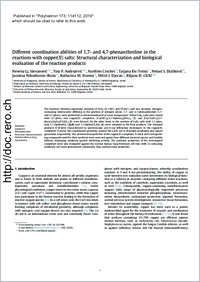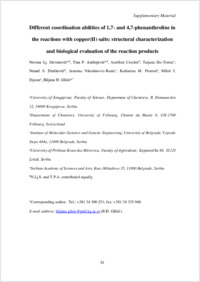Different coordination abilities of 1,7- and 4,7-phenanthroline in the reactions with copper(II) salts: Structural characterization and biological evaluation of the reaction products
- Stevanović, Nevena Lj. University of Kragujevac, Faculty of Science, Department of Chemistry, Kragujevac, Serbia
- Andrejević, Tina P. University of Kragujevac, Faculty of Science, Department of Chemistry, Kragujevac, Serbia
- Crochet, Aurélien Department of Chemistry, University of Fribourg, Switzerland
- Ilic-Tomic, Tatjana Institute of Molecular Genetics and Genetic Engineering, University of Belgrade, Serbia
- Drašković, Nenad S. University of Priština-Kosovska Mitrovica, Faculty of Agriculture, Lešak, Serbia
- Nikodinovic-Runic, Jasmina Institute of Molecular Genetics and Genetic Engineering, University of Belgrade, Serbia
- Fromm, Katharina M. Department of Chemistry, University of Fribourg, Switzerland
- Djuran, Miloš I. Serbian Academy of Sciences and Arts, Belgrade, Serbia
- Glišić, Biljana Đ. University of Kragujevac, Faculty of Science, Department of Chemistry, Kragujevac, Serbia
-
15.11.2019
Published in:
- Polyhedron. - 2019, vol. 173, p. 114112
English
The reactions between equimolar amounts of CuX2 (X = NO3− and CF3SO3−) and two aromatic nitrogen-containing heterocycles differing in the position of nitrogen atoms, 1,7- and 4,7-phenanthroline (1,7- and 4,7-phen), were performed in ethanol/methanol at room temperature. When CuX2 salts were mixed with 4,7-phen, two copper(II) complexes, [Cu(NO3)2(4,7-Hphen)2](NO3)2 (1) and [Cu(CF3SO3)(4,7- phen)2(H2O)2]CF3SO3 (2), were formed. On the other hand, in the reaction of CuX2 salts with 1,7-phen, only 1,7-HphenNO3 (3a/b) and 1,7-HphenCF3SO3 (4) were obtained as the final products. The obtained products 1–4 were characterized by spectroscopic and X-ray diffraction techniques. In the copper(II) complexes 1 and 2, the coordination geometry around the Cu(II) ion is distorted octahedral and square pyramidal, respectively. The antimicrobial potential of the copper(II) complexes 1 and 2 and corresponding compounds used for their synthesis were assessed against four different bacterial species and Candida albicans, displaying moderate growth inhibiting activity. The cytotoxic properties of the investigated complexes were also evaluated against the normal human lung fibroblast cell line (MRC-5) indicating moderate, yet more pronounced cytotoxicity than antimicrobial properties.
- Faculty
- Faculté des sciences et de médecine
- Department
- Département de Chimie
- Language
-
- English
- Classification
- Chemistry
- License
-
License undefined
- Identifiers
-
- RERO DOC 327950
- DOI 10.1016/j.poly.2019.114112
- Persistent URL
- https://folia.unifr.ch/unifr/documents/308220
Other files
Statistics
Document views: 114
File downloads:
- pdf: 241
- Supplementary material: 167

